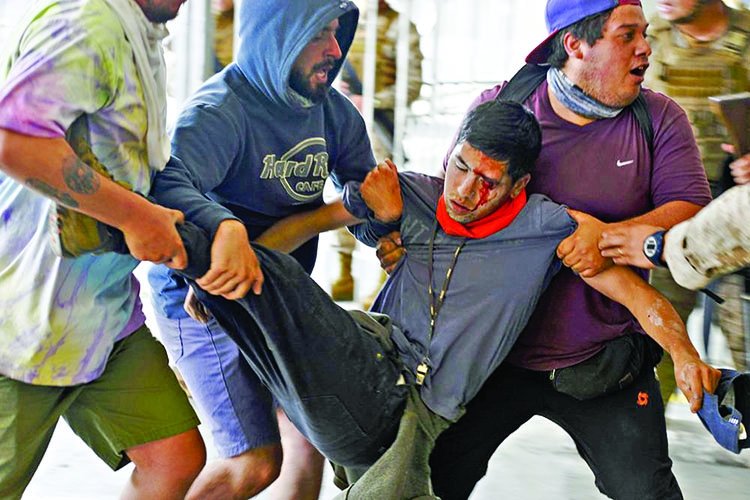Chileans blinded by police firing pellet guns on protests

Chileans are accustomed to seeing violent clashes between police and demonstrators but a new trend is leaving them shaken: the blinding of protesters by shotgun pellets fired by state's security agents.
Chile's main medical body says at least 230 people have lost sight after being shot in an eye in the last month while participating in the demonstrations over inequality and better social services that have overwhelmed the South American nation.
Of those, at least 50 people will need prosthetic eyes. "This means that the patient doesn't only lose their vision, but they lose their actual eye," said Dr. Patricio Meza, vice president of the Medical College of Chile.
The victims are on average 30 years old. In 80% of the cases, the damage is caused by the impact of a lead or rubber projectile on their eyes, Meza said.
"We are facing a real health crisis, a health emergency given that in such few days, in three weeks, we have had the highest number of cases involving serious ocular complications due to shots in the eye," he said.
What began on Oct. 18 as a student protest over a modest increase in subway fares has turned into a much larger and broader movement with a long list of demands that largely have to do with the wide gap between the rich and ordinary Chileans. People are calling for reforms to health care, education, the pension system and even the constitution, which dates back to 1980 and the military dictatorship.
At demonstrations, it's common to see police firing pellet guns at crowds. Often, "they're firing at 90 degrees, which is to say, directly at the face," said Meza. He said most of the injured say it's the national police force - known as the Carabineros - who are the ones firing.
The National Institute of Human Rights has said that while it condemns violence by protesters, this does not justify "the indiscriminate use" of pellet guns by riot police. Meza said other countries seem to follow protocols about the use of pellet guns but in Chile, "this is clearly not happening."
There are protocols in Chile around use of force by the police. They must first seek to establish order with verbal commands. The use of force is permitted in cases of active resistance, while the use of non-lethal arms is allowed during acts of active violence. Lethal arms are limited to situations that could be deadly.
The National Institute of Human Rights, Amnesty International and the Medical College have been urging the government to ban the use of pellet guns by police since the start of the Chilean unrest, but they have come up against a wall.
The appeal courts of Antofagasta, in the north, and Concepción, in the south, this week banned the use of lethal arms and projectiles against people who are protesting peacefully. University of Santiago rector Juan Manuel Zolessi said the Council of Rectors, which represents 29 private and public universities, has asked the courts in Santiago to ban the use of lead and rubber pellets by the national police in demonstrations.
On Sunday, police director Gen. Mario Rozas said the use of pellet guns will "be limited." The following day, theatre student Vicente Muñoz was hit by projectiles fired by a police officer two meters away, according to his sister. He lost sight in his left eye.
"I think it's absolutely incredible that, after all these cases of lost eyes, immediate action has not been taken to ensure it doesn't keep happening," said Ennio Vivaldi, rector of the University of Chile, where Muñoz studies. In response to demands that pellet guns not be used, Interior Minister Gonzalo Blumel said that "we need to be very careful about introducing changes that could result in a violent situation that is actually worse."
The massive demonstrations have been mostly peaceful, but it's common to see hooded protesters infiltrate the gatherings, hurling rocks, raising barricades and confronting police, who clamp down with violence. Rozas said police will start using a camera on their helmets to track their actions and the use of pellet guns will be limited to situations of "real danger" for police and citizens.
"Evidently, they are recognizing that they were doing something wrong," said Sergio Micco, director of the National Institute of Human Rights. Health Minister Jaime Mañalich announced an "ocular reparation program" for "victims of political violence" that covers the cost of treatment and psychological care.
The national prosecutors have opened 1,089 criminal investigations into allegations of "institutional violence" during the first two weeks of the conflict. Of those 70% are directed at the police.
